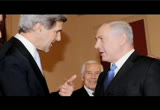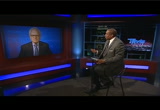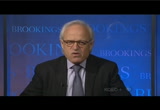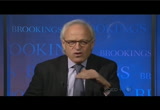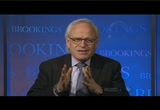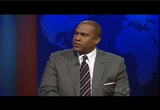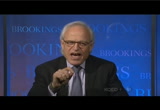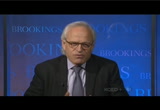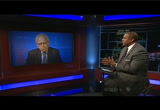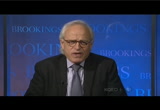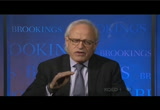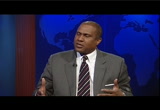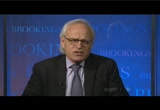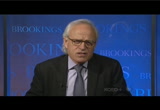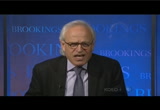tv Tavis Smiley PBS March 19, 2013 12:00am-12:30am PDT
12:00 am
tavis: good evening, from los angeles, i'm tavis smiley. tonight on the eve of president obama's trip to israel, a conferring with the former u.s. ambassador to that country martin indyk. the stakes are high. the question on the table can the president restart the middle east peace effort that eludes the region. conversation with martin indyk coming up right now. >> there's a saying that dr. king had, he said it's always the right time to do the right thing. i try to live my life every day by doing the right thing. we know that we're only halfway to completely eliminate hunger and we have a lot of work to do. wal-mart committed $2 billion to fighting hunger in the u.s. as we work together, we can stamp hunger out.
12:01 am
>> and my contribution to your pbs station from viewers like you. thank you. tavis: when president obama touches down in israel on wednesday, he'll bring with him a full agenda. first, there is the expectation that meaningful peace talks between the israelis and palestinians can be restarted. with the new secretary of state john kerry along on this trip, some in the administration hope a new spirit of collaboration can be established. there's also a new coalition government in israel, one that remains fractured when it comes to the establishment of a palestinian state. it is no secret that prime minister benjamin netanyahu and president barack obama have not
12:02 am
always seen eye-to-eye on the best road to peace and that's just the beginning for president obama on this historic trip. he has to deal with nuclear threats from iran and provide a road map for how far the united states will go in defense of israel. we will get insights to all of these challenges for president obama with the former ambassador to israel, martin indyk who joins us from washington where he is the vice president and director for foreign policy at the brookings institution. ambassador indyk, good to have you back on the program, sir. >> thanks, tavis, good to be with you. tavis: i guess the start is whether or not i have overstated the case. there are some who believe as i intimated a moment ago that the president's very presence in israel that's to say, our president, barack obama, signals to some there might be renewed vigor, renewed possibility for peace between the israelis and palestinians and there are many more others, perhaps, as i read, who think it's a false hope,
12:03 am
that the expectations on this need to be tamped down. where does ambassador indyk stand? >> certainly the white house has been trying to tamp down those expectations, including the president himself. he's going early in his second term, just a couple of days after the israeli government has been sworn in after their elections, so it's very hard to see what exactly could be done on this trip to actually achieve some i kind of resumption of the negotiations. if he were going to try to do that, he would have gone later he would have had the secretary of state go out, try to set things up in that way and come in and try to convene the negotiations. he's chosen not to do that and i think the reason for that is that he doesn't have himself high expectations that resumption of negotiations is
12:04 am
achievable at the moment so i think his purpose is manage else which could help further on down the road and that purpose is to reintroduce himself to the israeli public in particular. they have gotten the impression that he doesn't like them, that he wants to distance the united states from israel, his standing in israeli public opinion is at 10 points, believe it or not, a poll taken last friday, and i think that that's a bum rap that he has. he doesn't deserve that. he's been very supportive in many ways of their security but what they seem to care about is whether he loves them or not. they were showered with 16 years of affection by bill clinton and george w. bush and they got used to that and he now has an opportunity to go there, to explain to them that he's got their back, that he's been with them in their times of difficulties, whether it's at
12:05 am
the u.n. or rockets from gaza or the iranian nuclear program, and that he's going to be with them in the future, and i think he'll use his oratorical magic and i think he'll have a powerful impact and that will be very helpful for an effort to restart the peace process after he leaves. tavis: you've said a couple of things that i want to pick apart. let me start with the notion that the president has a very low standing, a low approval rating amongst the israeli public. what has been the cause of that and has his -- i'm trying to find the right word here -- fractured or less than lovie dovie relationship with bibi netanyahu had anything to do with that standing? >> well, it's interesting you use the words "lovie dovie" because the president is not a lovie dovie kinda guy and that's part of the problem.
12:06 am
israelis love to be loved. the rest is what have you done for me lately but they, you know they're basically fundamentally insecure and he doesn't show a great deal of affection but look at it this way. imagine there's two bookends here the june 2009 cairo speech in which he was attempting to reset relations with the arab and muslim world and he did a very good job in that speech but at the same time and i think unintentionally he left the impression in israel that it was going to come at their expense and the fact that he didn't go from cairo to israel and the fact that he didn't visit at all even though peace making was a top priority, and didn't have his own ambassador out there for 2 1/2 year and gave one television interview in
12:07 am
something like 3 1/2 years, gave them the distinct impression -- people on the left to the right -- that he didn't care about them, which was untrue but that's the impression that he left. so the second bookend is the speech he will make thursday evening israel time to a large group of young israelis in which i think he will have the opportunity, as i said, to reintroduce himself, to explain what he's about, to explain that he care deeply about israel security and he's going to take care of the threat from iran but he also wants to work with them to take care of that other threat that they face which is the demographic threat that comes from a failure to resolve the palestinian problem. you asked about netanyahu. they've had a very problematic relationship and i think both of them want to find a way to show that they can get on, so i think
12:08 am
this visit will be one in which you see many smiles and backslapping from the president and netanyahu even though i think they don't like each other much they both have good political reasons for trying to get on, and that can help them on the substantive policy issues as we go forward. tavis: when you suggest he will have an opportunity thursday evening, president obama to reintroduce himself to a group of young israelis, i notice the emphasis you put on the word "young," i think i know what you meant by that given the audience he'll be speaking to but how important, how vital, is that speech to that audience? >> well, look, the president is a rock star. he's an historic figure -- the first african-american american to be elected president and the second african-american to be elected president of the united
12:09 am
states. part of the reason that they feel shunned by him is because he's such a rock star. it wouldn't matter so much if he wasn't so popular around the world, and so i think young people will respond to him, young israelis will respond to him very well. i think this will be -- especially because he's so good at communicating, i think this will be a very positive speech and the consequence of that if he gets a bounce in israeli public opinion as i would expect, then bibi netanyahu will have to pay more attention to the things he asks him to do. the israeli public historically has punished israeli prime ministers who mishandle their relationships with popular american presidents. bibi netanyahu lost his election bid back in 1999 when he was
12:10 am
running against erude barack because the israeli public saw he mishandled his relationship with president clinton and netanyahu faces that problem now which is part of the reason why he's going to be so warm and effusive in receiving obama but if he sees that the israeli public now approve of obama going forward he's going to be very careful in terms of how he handles the things obama will inevitably asked him to do to move the peace process forward. tavis: when the president arrives on wednesday and gives the speech on thursday, what are your expectations of what he will say? we know now this is an opportunity for him and he knows obviously it's an opportunity for him to reintroduce himself to the israeli public but given there are no hopes at the moment
12:11 am
for renewing the peace process what is it that we do expect the to the say on thursday night? what will his talking points be if not the peace process? >> i think the first thing he's likely to do is to try to change the narrative that he himself used in his cairo speech back in 2009. there he linked israel's existence to the holocaust and the need to have a jewish homeland because of the efforts by the nazis to extinguish the jewish race. that narrative reinforced by the fact that he went from cairo to auschwits, i don't know if you remember that, was a problem from the israeli point of view.
12:12 am
israelis would like to believe their existence is justified not only by the holocaust but especially by the fact that the land that they are in is the land of their forefathers, the land that god gave to the jews and that narrative is something that obama missed completely in his cairo speech and so on this trip you will notice that he's going to go to lay a wreath not just on the grave of yitzhak rabin, the great warrior of peace, but also on the grave of theodor herzl, the founder of the zionist movement. he is going to identify with the founder of the zionist movement. i have to tell you frankly that i organized four presidential visits by bill clinton to israel. we never thought it was important for him to put a wreath on the grave of theodor herzl, but this is what obama's going to do and it's part of
12:13 am
that effort which you'll hear in the speech, i think to connect his understanding of israel's right to exist as a jewish homeland to its ancient roots in biblical israel. secondly i would expect that he will identify with israel's struggle for survival and its sense of insecurity in a region of turmoil around it and make it clear that he has their back, that he will be in the trenches with them and that he will prevent iran from acquiring nuclear weapons but beyond that i think that he needs to -- i don't know whether he will do this -- but i think he needs -- particularly because he's speaking to a young audience -- to talk about their aspirations for the future and identify with those and talk about how that
12:14 am
future needs to be a future of peace with israel's palestinian neighbors and paint a picture for them of a peaceful future that he wants to achieve by working with them, not working against them so that's the basic spark of the speech that i imagine he will give. we'll have to see whether my prediction is right. tavis: since you raid the issue of iran, let me ask you whether or not bibi netanyahu, the prime minister, has lost that battle to box the president in or put it another way to force president obama to box iran in with a particular date and a particular set of repercussions. we know he was pressing this issue rather hard a year ago at the u.n. and has made a number of trips to our country and hit media round heavy here in the
12:15 am
states to put pressure on the president. he spoke to congress and raised this issue as you will recall. has prime minister netanyahu lost that fight? is that a fight on hold? has it been tabled for the moment? what's your sense of where that tug of war is between president obama and prime minister netanyahu on the issue of boxing iran in so to speak? >> i think he has lost that fight at least for the time being. the president, in an interview he gave to israel television a few days ago, said that he thinks it's probably a year before iran can acquire a nuclear weapon so there's still time for negotiations. you may recall that in his u.n. general assembly speech when he held up that diagram of the bomb and the red line drawn across the top of it, that netanyahu talked about the summer of this year being the critical moment.
12:16 am
now, what's happened since then is that the iranians seem to have recognized netanyahu's red line and as they acquire through the centrifuge cascade process enriching uranium 20%, as they get closes to one bomb's worth, bibi's red line, they've been moving some of that enriched material off into fuel rods which make it harder for them to use for a nuclear weapon so they're staying beneath bibi's red line for the time being and as long as they do that, i think the argument will go away. as soon as they cross that red line, netanyahu, i think will come back quite forcefully but it's interesting to note that while the president said, you know, it's a year off, we didn't hear a word from netanyahu
12:17 am
contradicting that and i don't think we're going to for on this trip so maybe that becomes the new time table. of course, there's another player here which is the iraniabs and it also depends on what they decide to do. the centrifuges are still running, the fuel stockpile is growing and if they cross that red line, it's a different ballpark. tavis: let me come back and talk about the peace process. we know what not to expect from this trip given the comments we've had with you tonight with regard to the peace process. but what does this trip, then say about the stalled peace process? if we know we should not have any high expectations about that this week, what does that say long term -- and i say long term, i mean for the rest of this president's tenure in the white house, his second term -- what does had a say to us early on about the level of engagement or lack thereof with the peace
12:18 am
process on the part of his administration? >> i think the president had his fingers burned rather badly and came to be quite disillusioned with both the leader of the palestinians and bibi netanyahu and so i don't think that he's really prepared to make it his top priority in the way that he said he wanted to in first term. but secretary of state john kerry intends to make it his top priority and he's concerned that the window on the two-state solution is closing. he doesn't that want to happen on his watch. he thinks that because of his 100% voting record on israel over all the time he was in the senate, nobody can accuse him of not being a strong friend of
12:19 am
israel he has very good relations both with netanyahu abu mazm, arab leaders, even president morsi of egypt, he's already met with him seven times and the secretary of state says the time for middle east envoys is over, auto time to do it at my level so we're going back to a secretary of state, somewhat like in the clinton years and even back to secretary of state kissinger, who's going to do it himself, and the critical thing here is that the president make it clear during this trip that he's delegating this to his secretary of state but he's going to back him 100% in that effort because the leaders in the region will want to know that the and the behind his
12:20 am
secretary of state. if he just lets him go off and try, then keri -- kerry is not going to be able to move the process forward so what i'm going to be watching for is whether it's in the speech or the photon with the prime minister and the palestinian president, is the president going to empower his secretary of state to try to move this forward. tavis: so what's your read on the impact that this government, this israeli government freshly formed the other day after a lot of back-and-forth just in time for president obama's arrival they at least have called together some form of government now, what's your sense of how that body and its formulation will impact the peace process? as i read here and there the sense i get is that this is not the kind of government as it's
12:21 am
currently formed that in any way advances that notion. is what i'm reading or taking from that right or wrong? >> it's a mixed picture and i'm not sure we can make a judgment yet. i think we have to withhold judgment for the time being. i say that because on the one hand you have the same foreign minister who says nothing can be done on the palestinian issue. you have now a new defense minister boga yagalon, former israel defense forces chief of staff who's a very tough guy who doesn't have the same commitment as his predecessor, ehud barak to the two-state solution. he, too, is saying nothing can be done. you have a new housing minister who used to be the head of the settler's council, he's a settler. you have deputy defense minister
12:22 am
who is a strong supporter of the settlers and you have this newcomer rising star, naftali bennett, modern orthodox leader of the jewish home party who says over my dead body will there be a palestinian state and proposes the annexation of 60% of the west bank. so if you like, that's the bad news for the peace process. the good news is, number one that netanyahu who is the decider in these matters as prime minister he wields immense authority, he understands he has to do something about israel's isolation and has to be seen as attempting to resolve the
12:23 am
conflict. number two you have sippy livni who was the only candidate to run on the platform of resolving the israeli-palestinian conflict. he only got six seats but she's been given responsibility for working on the peace process as she did when she was person to minister in the olmert government so she's going to be pushing for it and then you have the other rising star of the center party israel has a future party and he cares about resolving the palestinian conflict, it's just that his constituents care more about social issues, about getting the ultra orthodox to share the burden and do their military service, those kinds of things. so he's placed his interests above the peace process but he still cares about it and he'll be supporting livni. tavis: i take your point that it
12:24 am
is a mixed bag and i thought that might be your answer and appreciate the insight you've given today. thank you for coming on. we will talk in the coming days about what the trip does yield but i'm decided to have you on the program and thanks for sharing your insights. >> always a pleasure to talk to you, tavis. tavis: martin indyk joining us from washington. that's our show tonight. good night from l.a., as always keep the faith. >> for more information on today's show, visit tavis smiley at pbs.org. tavis: i'm tavis smiley, joining me next time for a conversation with two outstanding musicians migail and charlie hayden. >> there's a saying that dr. king had, he said it's always the right time to do the right thing. i try to to live my life every day by doing the right thing. we know we're only halfway to completely eliminate hunger and
12:25 am
254 Views
Uploaded by TV Archive on

 Live Music Archive
Live Music Archive Librivox Free Audio
Librivox Free Audio Metropolitan Museum
Metropolitan Museum Cleveland Museum of Art
Cleveland Museum of Art Internet Arcade
Internet Arcade Console Living Room
Console Living Room Open Library
Open Library American Libraries
American Libraries TV News
TV News Understanding 9/11
Understanding 9/11

